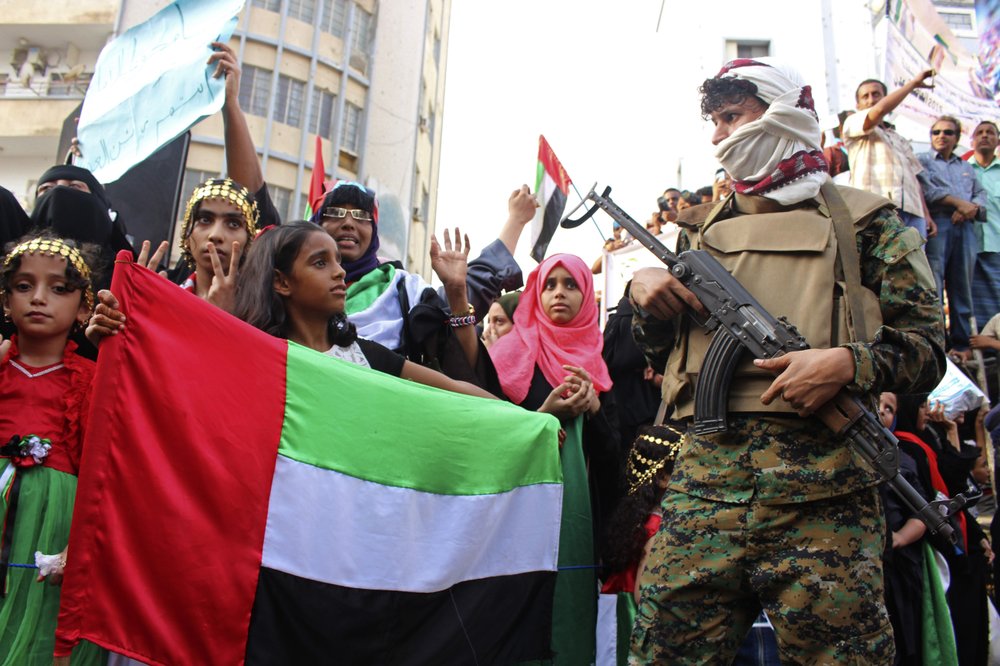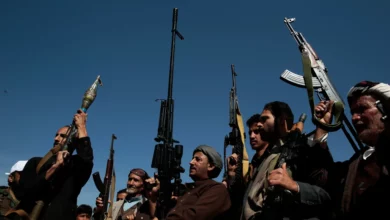Sanaa – The collapse of a delicate ceasefire in Sanaa on Tuesday reinforced the threat of civil war in Yemen, as government forces shelled the capital’s Hasaba neighborhood and street fighting erupted in the city, claiming at least seven lives.
The shelling targeted the home of Sheikh Sadiq al-Ahmer, head of the powerful Hashid tribe and a former political ally to President Ali Abdullah Saleh, strongman of 33 years.
Clashes in the past two weeks between pro-Saleh forces and those loyal to Ahmer, who defected to the protest movement on 19 March, have killed more than 215 Yemenis. Last Wednesday, an entire family was reportedly killed by a rocket attack in Hasaba.
“Sanaa is no longer safe for us,” said a 60-year-old woman who fled from her home in the Hasaba, an area that holds several government ministries. “We want to feel secure in our country. I was on Saleh’s side all the time and how is he rewarding us? By shooting and killing us.”
Seeking respite from the violence, Sanaa’s residents are fleeing in mass numbers. Some are returning to their villages in provincial Yemen, while others are finding refuge with relatives or friends in other parts of the city. But safe shelter is not available for all those looking to escape the clashes.
“Many of my neighbors that don’t have any where else to go, they are under threat all the time,” the woman added. “He [Saleh] has to leave the power if he cares for his people.”
The truce, struck after fighting flared in the capital last week, lasted just two days.
“We started this committee after watching the children dying there… We are trying our best only because we care for the residents,” Shiekh Qasem al-Kusadi, a mediation committee member and a ruling General People’s Congress MP told Al-Masry Al-Youm. ”Both parties are hidden and well protected. They fight and lose nothing at the end. Only the residents lose their lives.”
The Hasaba neighborhood has been blockaded with rocks on all sides in recent days. Residents relay information on the presence of snipers, both loyal to Saleh and Ahmer, in the area. The streets are empty.
“What can I do? I have nowhere else to go,” said an old woman near the prohibited area who suffers from Parkinson’s disease. “Although I’m old they decided that I shouldn’t die peacefully and I should die through grief and fear. God is great and will protect us. We can’t seek any other protection. No one can help us today.”
Young members of those families unable to flee are also forming defense committees to protect their property from looters and to prevent combatants affiliated with both Ahmer and Saleh from using their houses as military positions.
“We are trying to focus on preventing anyone from using our buildings in this fight,” said committee member Mohammed Abdu over the phone to the sound of shelling.
The committee members hide in the district’s buildings and prepare for the clashes. Should the worst-case scenario present itself, they say they will use their personal weapons against any attacker.
“We are fighting tribes, military people and civilians thugs to survive in the middle of their battles,” said Abdu. “The only thing we can do for protection is to close those rooms that are facing the battle and live in other rooms in the same house.”
And, as military camps based in the mountains surrounding the city continuously rain down rocket fire, not only Hasaba residents are fleeing. Residents throughout the city are escaping the incessant sounds of explosion and the looming threat of increased violence.
“We were up the whole night and couldn’t sleep while they were shooting,” said Om Anwar who lives behind the Nuqom military camp. “Although there is no threat to us yet, we fear that Ahmer will target the camp as they were hit from it.”
Youth committee members vowed to prevent escalation toward civil war by ensuring the violence does not spread from Hasaba.
“This is our country… our lives,” said Abdu. “We won’t let them play with it.”




